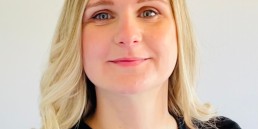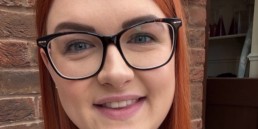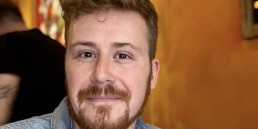Hi,
My name is Kate, I am 26 and from Manchester. I was diagnosed with relapsing remitting MS in September 2020. I have always loved animals and the countryside, and began training to be a vet at the University of Liverpool in 2015.
When I got to my third year at university, I noticed that I was feeling very tired. At first I thought I could be anaemic so I had some blood tests done. It turned out that I wasn’t anaemic but my Vitamin D levels were very low and I was given supplements. This helped a little bit but I was still tired.
Then in my fourth year at university, I began to have spasms of the right side of my face. I felt extremely tired and at times just collapsed on the floor with fatigue. I was able to get through the day of lectures, but once I got home I would simply collapse in my room. During episodes when I was very tired, I would lie down and sometimes my eyes would blink uncontrollably and roll back in my head.
I felt a mixture of emotions at this time. I thought I could have a brain tumour. But I also wondered why the symptoms came and went. I thought to myself, ‘Am I imagining all of this?’
And then one day, when I was home from university, I had a very bad episode. After returning from a trip to the countryside for a walk, I collapsed in the hall as I was so tired. I managed to get myself upstairs to bed. Then the right side of my face went into spasm and my eyes were blinking uncontrollably. I tried to stop it – ‘It’s all in your head’, I told myself. But I couldn’t. Lying in bed, I burst into tears as I thought I definitely had a brain tumour.
I booked an appointment with my GP and handed her a list of my symptoms to make sure I didn’t miss anything out. She told me that the spasms of the right side of my face could be due to stress. ‘But I’m not particularly stressed about anything,’ I thought. It wasn’t exam season and these episodes had been happening even when I was at home and relaxing with my family. Plus I’d been stressed before and never had these symptoms. But then I began to think, ‘Well maybe I have just got myself stressed wondering if I have a brain tumour. Maybe it’s all in my head.’
I left the appointment and met my Mum who was waiting for me in the waiting room. ‘She thinks it’s stress,’ I said. When Mum heard that I hadn’t been referred for an MRI scan she was very annoyed. She said, ‘Right, that’s it – I’m booking another appointment and I’m coming with you.’ Thanks to my Mum’s persistence, I got another appointment with a different GP in a few days. Mum accompanied me this time and was able to advocate for me. The GP still thought my symptoms could be stress-related but referred me for an MRI brain scan.
I finished early from university one Friday and Dad brought me home for the weekend to get my results that afternoon. The GP told me gently that my scan results weren’t entirely normal. ‘There’s no brain tumour, but there are a few lesions in the white matter.’ She explained that this could be due to MS, but that I would need to be referred to a neurologist for further investigations. Firstly, they would need to rule out diseases which mimic MS. Then, in order for MS to be diagnosed, there would need to be at least one new lesion in a different space and at a different time from the lesions on my original scan.
I felt so relieved. I didn’t have a brain tumour and I now had an answer for my symptoms – it wasn’t in my head after all! I didn’t know anything about MS so the mention of it didn’t mean anything to me. For my Mum, who had been reading about it, it was more upsetting. It was only after I did some research that I began to wonder what it might mean for my future if I did have MS. Would I be able to finish university? Would I be able to drive?
During this time, I felt like I was living my life in limbo as I didn’t yet have a diagnosis of MS.
I told my friends at university when I returned that I could have MS. They were all very supportive and kind to me which I was very grateful for. I relied on my housemates for lifts to university during my fourth year. The diagnosis of clinically isolated syndrome meant that I felt anxious about driving. I also thought, ‘What’s the point if it is all going to be taken away from me?’ During this time, I felt like I was living my life in limbo as I didn’t yet have a diagnosis of MS.
I was glad to return home for the Christmas holidays for a break. I saw a neurologist for the first time during the holidays. He wrote a letter for me so that I could let the university know about my diagnosis of clinically isolated syndrome. I felt very fatigued during the Christmas holidays. On Christmas Day, I found it very tiring having conversations. I had collapsing episodes at home due to the fatigue and at times had been limping on my right leg. Some nights I had to go up the stairs by sitting down and dragging myself up, step by step.
After my Christmas holidays had come to an end, it was time to pack up my things and head back to university. I felt stressed and anxious about going back, especially given my symptoms. As I was trying to pack my things away, I had some collapsing episodes. I tried to pack my bags sitting on my bedroom floor and found that I was unable to stand up. My parents were very concerned and wanted to take me to the hospital. ‘No,’ I said. ‘I have to go back today – I have university tomorrow.’ They brought my aunty (who lives around the corner) over to have a look at me, just so she could see how bad I was. I was normally able to hide my symptoms from other people so this was a good test. Even when my aunty came in my bedroom, I couldn’t get up. It took me a lot of effort to eventually stand up. ‘You have to go to hospital,’ she said to me. They didn’t want me doing any further damage. So that was that. Mum and Dad took me to A&E and I was eventually seen by a doctor. I was prescribed steroids (5 days of methylprednisolone tablets) and an emergency appointment with my neurologist was booked for the following week.
That week was a difficult week for me. I felt upset and stressed that I was missing a week of university. I wondered if I would be able to go back. I was also suffering from side effects of the steroids – I was sick at times and had headaches. I managed to keep up with the lectures by watching the recordings.
After finishing the course of steroids, I felt much better. My neurologist said that I was fit to return to university and so Dad dropped me back. I felt so grateful to be able to go back.
I had to let the university know that I was missing a week due to this flare-up and had filled out an absence form. They asked for another letter from my neurologist as they were concerned whether I would be fit to begin my rotations (assessed placements at the small animal, equine and farm animal clinics) in April. My neurologist provided a letter saying that, although this was impossible to predict, he hoped that my symptoms would settle down and that I would be able to complete my studies. I was advised by the university to fill out an extenuating circumstances form detailing that I had missed a week due to this flare-up. I was granted extenuating circumstances which meant that my first attempt at my fourth year exams would be treated as a zero attempt and so I would have two further opportunities to resit them if I failed (as opposed to only one) before having to resit the year.
I settled back into university again and felt much better. I had another MRI scan of my brain which showed no change and had an MRI scan of my spine which was clear. I also had a lumbar puncture in March 2019. I was terrified before having the lumbar puncture done but I didn’t feel a thing and felt fine afterwards. I had taken the day off a placement at a small animal practice to have it done and felt fine to return to see practice there the following day. This turned out to be a mistake because by the afternoon, I had an awful headache and felt incredibly sick. The headache a lumbar puncture causes can only be relieved by lying down so when I got home I went straight to bed. I would advise anyone else to rest on the day of a lumbar puncture and also the day afterwards.
My lumbar puncture was negative for oligoclonal bands (the antibodies often found in the cerebrospinal fluid of MS patients). However, my white blood cell count was raised.
My neurologist thought that my symptoms may be due to chronic fatigue syndrome and referred me to a fatigue clinic. He prescribed amantadine which helped with the fatigue. He arranged a repeat brain scan for July 2020, when I would have finished my veterinary studies.
In the meantime, I enjoyed completing my veterinary rotations at the university clinics and was able to drive myself the short distance to and from university. I did find it tiring though and wondered why my housemates had so much more energy than me. After a full day on rotations, I was exhausted and ready for bed at 9pm. On the other hand, they could go out to the gym after university and stay up later.
I also found that my brain wasn’t working as well as it used to, especially when I was tired. There were several moments which made it clear to me that something wasn’t quite right. I remember on one occasion bumping into my friend in the small animal hospital. When she asked me what service I was on (as we were placed in a different specialism each week), my mind went completely blank. I spent ages trying to figure out which week I was on (was it dermatology, cardiology…). I just could not remember. Eventually she said, ‘Oh well, I’m sure whatever it is it’s good.’ I felt so embarrassed.
On another occasion, when doing night shifts at the equine hospital, I got confused between two very similar white ponies we were looking after. I had been asked to double check the heart rate of one of them but checked the wrong one and had to go back and check the correct pony.
Then there was the time I had to do a check on a horse in isolation. I was used to doing checks in the proper isolation stable, where we would change our wellies and overalls. This was a makeshift isolation stable though and there were no wellies to change into (only plastic boot covers to put over our own wellies). I had taken my wellies off as I would usually do and had absent-mindedly put the plastic boot covers on over my socks. I realised my mistake before entering the stable. I was so embarrassed but knew I had to say something – I couldn’t do a check on a horse in my socks! I tried to explain my problem but the intern supervising us didn’t understand at first. Eventually, my fellow student had to say, ‘She’s in her socks!’ and the intern then handed me in my wellies. I felt so frustrated with myself that my brain wasn’t working properly.
My lowest moment came in my first week in the small animal hospital. It was a baptism of fire as we were in the neurology service for our first week. The neurology patients we had to look after required a lot of care. It was overwhelming – I felt tired and very stressed. I was looking after a little dachshund who was recovering from surgery for a slipped disc. He was paraplegic. We had to do his physiotherapy; massaging alI the joints in his legs. Then we had to fit a sling around his back legs and support him as he shuffled outside for a little walk. He was unable to urinate by himself – he needed to have diazepam tablets to relax his bladder so that the nurses could express it.
I had the job of giving him his diazepam tablet. I couldn’t get him to take his tablet on one midday check so I asked another student in my group to help me. She was great at tableting dogs but even she couldn’t get him to take his tablet. I spotted the neurology nurse outside the kennel and asked her if she wouldn’t mind helping us to tablet him. I will never forget the look of horror on her face – ‘What are you doing?! He doesn’t have his diazepam until the 4pm check!’
Fortunately for us, our patient was very difficult to tablet and so didn’t have any diazepam on that occasion. Unfortunately for me, I was marched in for a word with the senior neurologist.
She asked me if there was anything else going on that she needed to know about. I just burst into tears. I wanted to say, ‘I could have MS’ but I was worried that she would think that I was unfit to practise as a vet (and was crying too much to speak anyway). I had felt so overwhelmed all week and now I was wondering if I was fit to practise as a vet. She asked me, ‘Have you seen a hospital sheet before?’ I nodded and said that I had seen them in the equine hospital. She must have been thinking, ‘Why can’t you read a hospital sheet correctly?’ She left the room to go and get a blank hospital sheet and brought it back for me to look at. I am not really sure what this achieved – I think she just didn’t know what to do with a crying student. Eventually, I was let out to rejoin my fellow students. I couldn’t go somewhere private to compose myself (as the bathroom was near the student congregation area) so they could all see I was upset. I felt very embarrassed. Everybody else seemed to be coping so well but I felt like a complete mess.
With time, I got more used to the practical rotations in the clinics and I enjoyed working with all of the different animals.
In my final year, the Covid pandemic meant that we were sent home a week early from our rotations for study leave. I did a two week lambing placement (which I found exhausting) and then knuckled down to study for my final exams. Due to the pandemic; our exams were all open book, multiple choice exams done online at home.
I managed to graduate (online!) in July 2020 and am very grateful that I managed to make it through my studies.
All I could think in my head at that point was, ‘I have MS, I have MS, I have MS…’
I had another brain scan in July and was waiting for these results before applying for jobs. If there was no change, my plan was to apply for a job in a mixed practice and achieve my dream of working with all creatures great and small (like my hero Alf Wight). I got a phone call from my neurologist on the 7th September 2020 with the results.
‘We’ve got the results of your brain scan,’ he said. ‘So there aren’t many lesions, which is good, but compared to your previous scan there are a few more…’
All I could think in my head at that point was, ‘I have MS, I have MS, I have MS…’
He continued, ‘So we were working off a diagnosis of clinically isolated syndrome but this does change the label to MS. But don’t worry, it’s only the label that changes…’
But of course, everything changed.
And so my journey with MS began. Since then, I have had many medication failures due to side effects and my last scan showed that my MS was active. I haven’t been able to work since graduating due to my symptoms. This has been very difficult for me but I am beginning to come to terms with it and to accept that perhaps a job in clinical practice may be too demanding for me. Maybe I will be able to find a suitable job in time. At the moment, I am just taking one day at a time.
My life has changed since being diagnosed with MS but it has not ended. There are challenging moments but also so many good and beautiful moments. I live at home with my parents, sister and two cats. I am very grateful for the support of my family during this time – I don’t know what I would do without them! My Catholic faith is also very important to me and has been a source of great comfort and strength for me. My pace of life has slowed down due to my MS but I am more appreciative now of the simple things.
I think there are two ways to view a diagnosis like MS: you can see it as a blessing or as a curse. As strange as it sounds, I try to be grateful for my diagnosis because I can see that good can come out of it. For example, it proves to me how much my family love and care for me and has brought us closer together. I also appreciate life more. There are difficult and frustrating moments; moments when you grieve for the losses MS can bring. In those moments, I hope that you will know that you are not alone.



